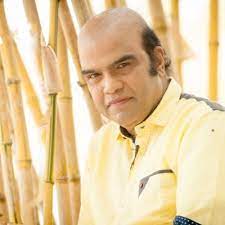


Most of you who lived in India from the 60s until the late 70s must have tuned into Radio Ceylon to listen to film songs. Some of you must have been die-hard fans of that silken voice of Ameen Sayani, presenting the Binaca Geet Mala, a countdown of the top songs from Hindi films.
Then there was B.H. Abdul Hameed of the Tamizh Sevai, with Tamil film songs. Radio Ceylon even reached remote points in Assam’s tea estates! For the budding rock stars of India, Radio Ceylon was the go-to source for their favorite music.
Advertisers in the sub-continent flocked to Radio Ceylon. Their top salesman (back handed compliment) was an Indian minister, Balakrishna Vishwanath Keskar, also known as B. V. Keskar.
Keskar was the Minister for Information and Broadcasting from 1952 to 1962 who, amongst other things, banned filmed music from All India Radio, saying that it was morally corrupting.
Keskar also prohibited the harmonium, saying that it was a Western instrument. Until 1972, the harmonium was banned entirely from the Radio.
To Keskar’s credit, the man in charge of the Radio pre-independence, Lionel Fielden, a senior BBC producer and then Controller General of Radio, had a similar opinion.
The ban on the harmonium came about after John Foulds, an expert on Western music, said that the instrument was ill-suited to reproducing microtones, an essential aspect of Indian music. So, the harmonium was banned from All India Radio until about 1970.
Keskar hated cricket and predicted the game would die out soon since the British had quit India. He thought cricket was a British legacy and tried to ban cricket commentaries on AIR. Due to intense pressure and backlash, he relented.
Keskar also tried to ban film music. He then relented a little bit and allowed 10% of airtime. He tried negotiating with the Motion Picture Producers Guild of India, who opposed this quota, which talks broke down, resulting in AIR stopping broadcasting film music for several years.
BV Keskar also claimed that All India Radio was not likely to air musicians such as Kesarbai Kerkar or Omkarnath Thakur due to their high fees. As a minister, B.V. Keskar also banned the playing of folk films on Radio as he felt they did not have respect for higher culture.
Film music had an increasing audience in India, and Keskar’s decision to prohibit it over All India Radio allowed Radio Ceylon to take advantage of this opportunity.
Keskar would be outraged if he heard the music the film industry makes today. Still, it is ironic that some of the most iconic and memorable songs in newly independent India, made during the golden era of Hindi cinema, were once considered objectionable and would have been perhaps stifled by a draconian policy of a single man had a radio channel from a neighboring country not intervened. Filmfare magazine has described Keskar as a cunning person whose decisions were as much calculated shots to damage the movie industry’s image as they were to drive movie music from the market (August 1952 edition). Keskar believed that Indian music had become stale during the Muslim and British rule. B. V. Keskar wanted AIR to work towards the cultural growth of a young nation.
B.V. Keskar also discontinued the practice of advertising film titles along with the songs, as he felt that was marketing. Keskar was also responsible for establishing the Vadya Vrinda as a national orchestra and creating a new genre of lighter music, commissioning the Sitarist Ravi Shankar to lead Vadya Vrinda and to provide light musical alternatives to the broadcasting of classical music. Keskar was the third person to head India’s Ministry of Information & Broadcasting and had a ten-year stint at the helm, making him the longest-serving Minister in the Ministry.
The worst was in 1959, the Minister of information and broadcasting, B. V. Keskar, who is said to have had the barbaric opinion that Indian Christians should not be composing Indian music, refused to allow Anthony Gonsalves to write a piece of music for an animated movie. You can listen to Anthony in a rather painful conversation with Rajan Parrikar, a musicologist born and raised in Goa who moved to the USA in 1988 for graduate study and obtained a Ph.D. in Electrical Engineering at the University of Colorado at Boulder and currently lives in Iceland.
. I hate to end a blog this way but let this sting.
Cited Sources
- https://www.magzter.com/ja/stories/Business/Businessworld/Needed-A-National-Media-Entertainment-Policy-Framework 0
- https://www.deccanherald.com/content/667361/harmonium-solo-air-four-decades.html 1
- https://lifestyle.livemint.com/how-to-lounge/movies-tv/in-1952-hindi-film-songs-were-banned-on-all-india-radio-111644474070100.html 2
- https://www.hindustantimes.com/columns/the-harmonium-continuum/story-iec2mQk7JagdPy2vOLL0HK.html 3
- https://www.outlookindia.com/website/story/harmonium-in-indian-classical-notes-from-a-3-decade-air-ban/306525 4
- https://www.theindiaforum.in/amp/article/hindustani-music-patronage-problems-and-patreon 5
- https://bookofachievers.com/articles/-what-was-this-goan-music-maestro-disappointed-about-the-film-industry 6
- https://caravanmagazine.in/lede/voice-next-door 7
- https://www.moviemurga.com/ib-minister-barred-hindi-film-songs-air/ 8
- https://www.constitutionofindia.net/constituent_assembly_members/b_v__keskar 9
- https://peoplepill.com/people/b-v-keskar 10

